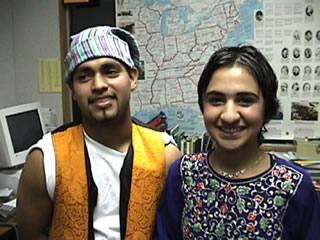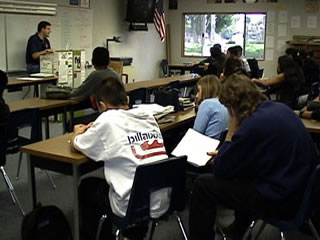We work on one Shakespearean text from day one until we close
the show– we run for one weekend (with a lot of previews) the
second weekend in December. We have a week before
break, and then three weeks after break, and then the semester
ends and the class ends. They move onto something else.
When the show ends, for those 4-5 weeks we write one-acts,
scenes, monologues, some based on the show, some of their own
choosing. So how do we get from day one to closing night?
Theater
Games: Getting to know the students
I was trying to cast Prospero in the
Tempest a couple of years ago, and you just need your
best actor to play that. A girl joined us a couple
of weeks into the class– I just heard her, she
had this lovely Spanish lilting tone, and it was clear
how bright she was. I had to make sure she could
do it—first of all, Prospero’s a man, and
I wanted to make sure what she would do with that. That
she had the will to see through this huge project.
There was a theater game called “Make ‘em
Laugh” where everybody lines up against the wall
and one person tries to make them laugh. Another is a
group yawn, a group laugh—helps me to see who’s
loose. So this girl was getting people out and
making people laugh, and at one point she drew herself
up and jumped up in the air and just plopped down—it
was just outrageous! And she got everybody else “out”. There
was just something so daring about it, and irreverent,
that I thought—this is somebody who would understand
the complexity of Prospero, and who’d have the
guts and courage to see it through to the end.
It’s a large role—I’d
even thought about dividing it up and having several
students each perform a scene, and share a large magician’s
cloak. You’re always thinking, “What
if? What can I do theatrically to make this work?” But
she was able to do the whole role, which was obviously
much more effective. |
Typically in a theater class,
you’d have auditions day one and by day 3-4 you're cast,
and then the kids who don’t get cast find another class. But
the kids who are in my class are in my class from day one to
the end. They’re all guaranteed something in the
show. I’ve got to find something for them to do, performance-wise,
in addition to production chores. But you can’t
cast the show because most of them can’t read English. So
we start off the show with Lamb’s
fairy tale version
of the play, which is not easy, because it’s 19th century
prose. But I’d rather have them struggle with that,
get to know the text that way, than struggle with the text
they’re
going to be performing– I don’t want the
text they’re performing to have that negative baggage
attached to it.
While they’re getting to know the
story, they’re
reading aloud, they’re working, I have them storyboard
it, do an art project where they do six plot points that they
draw out. We're doing things to get them to visualize
what the story is about. Meanwhile, I'm observing how
they work in groups, their attitude, their attendance, their
punctuality, how they read; I'm also getting to
know them as people. Sometimes, someone reads really poorly,
but I just know that
they’re perfect for a certain role.
Casting as a Means of Assessment
If you screw up in casting, you’ve really made it hard
for yourself and all your students, so it’s really important
to be
sure. Last year, we had a boy who played Ferdinand
in the Tempest—the kind of kid who when he came out on
stage, all the girls in the audience would go “Awwwwwwwwww!
He’s so sweet!” He was a senior this past
year, and the counselor had him come be in the show again, and
normally I don’t get too many returnees, because they have
so many classes they have to get in. But we were lucky enough
to get him , and I thought, we’ll have him to do the lead,
Claudio. So they’re auditioning, and I had him do
the scene with Beatrice, and – it was okay, but I said, “Gustavo,
can you do this again? I think he’s really angry here.” Because
Claudio becomes uncorked when he’s been betrayed, that’s
why you need the anger. But because he’s such a sweet kid,
I’d never seen him be angry in his life. “Could you
be a little more angry here?” and he said, “I don’t
get angry.” And then I kind of thought about his life,
I know from his writing, his family difficulties. So I
know how to get anger from him, but there’s probably a
reason why he doesn’t get angry, and it’s not good
to meddle.
Sometimes, you do want to push somebody out
of their comfort zone, but I just had a sense that he had figured
out a way to get through a very difficult time in his life,
and he’s not ready to give that up. I don’t want to push
him. So I said, “Why don’t you read Don Pedro—this
is great, because last year you played the lover, and this year
you’re going to be the man among men, the big friend, the
one everyone looks up to.” And really, he had been
through this before, he was the one that everyone
looked up to. And so that was fun. I still needed to find a Claudio
.,
and there was a kid that I thought—he was a new kid,
who was all “guy”—which is hard to find sometimes
in high school, and I knew he could get angry, and he was wonderful and
very inventive. Super inventive. And even though
he was a sophomore, the age difference—sometimes a sophomore
will be so deferential to the seniors, but I just knew that he
would be fine, and he was. He was way better than I even
hoped. So you have to assess not just their skills, but
who they are.
Writing For My Students
Last year, I got this idea that I should start writing prologues,
epilogues, something to give kids more opportunities onstage.
Because if you look at these adapted texts I’m using, there
might be 16 roles, and yet I have 25 kids, or 30. Last
year I had over 40 kids, but by the time we opened, I only had
32. Two kids got expelled, but I’d cast them as villains,
so, it was a good casting decision. (laughs). So
I wrote a prologue—the other thing that does is kind of
includes the audience. A lot of these folks don’t
speak English. I write a scenario for a prologue, and last year
I had a student flesh it out, and I would direct it, she was
the second director. We really had fun, said, “Let’s
throw in some Spanish, make sure the pace is picked up, there’s
no dead air.” So I used my writing—I’m
not a professional writer, but I’d written a couple of
plays, something I was interested in so I did it—so I used
that to give roles, and do some other things. It’s funny,
because part of me, when I’d write, and I thought about
it as having a broader audience. When I usually write,
I write poems and stick them in a book, maybe someday when my
kids are 40 they’ll read them. So I didn’t
have a lot of confidence in my writing, but now, I have a pressing
need to get a scene going. You don’t think about
whether it’s great or not, it serves a need. For
me, that was interesting. It’s hard for me to feel great
about writing for any extended period of time, because I’m
not a pro, what could I possibly have to say?

